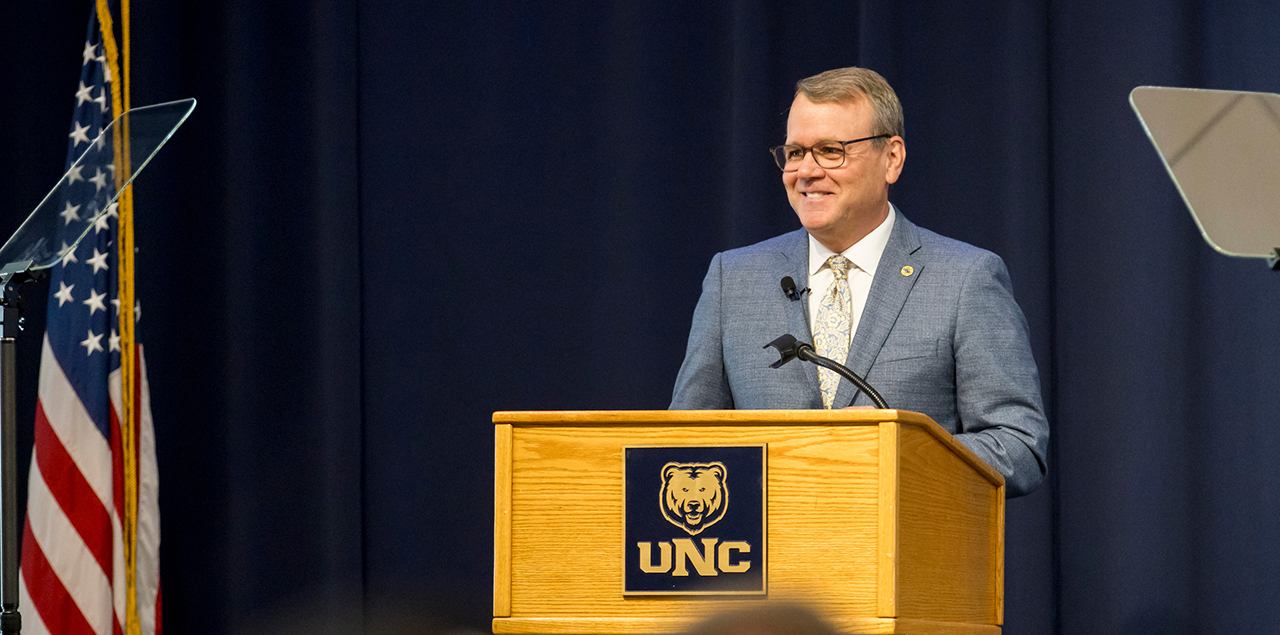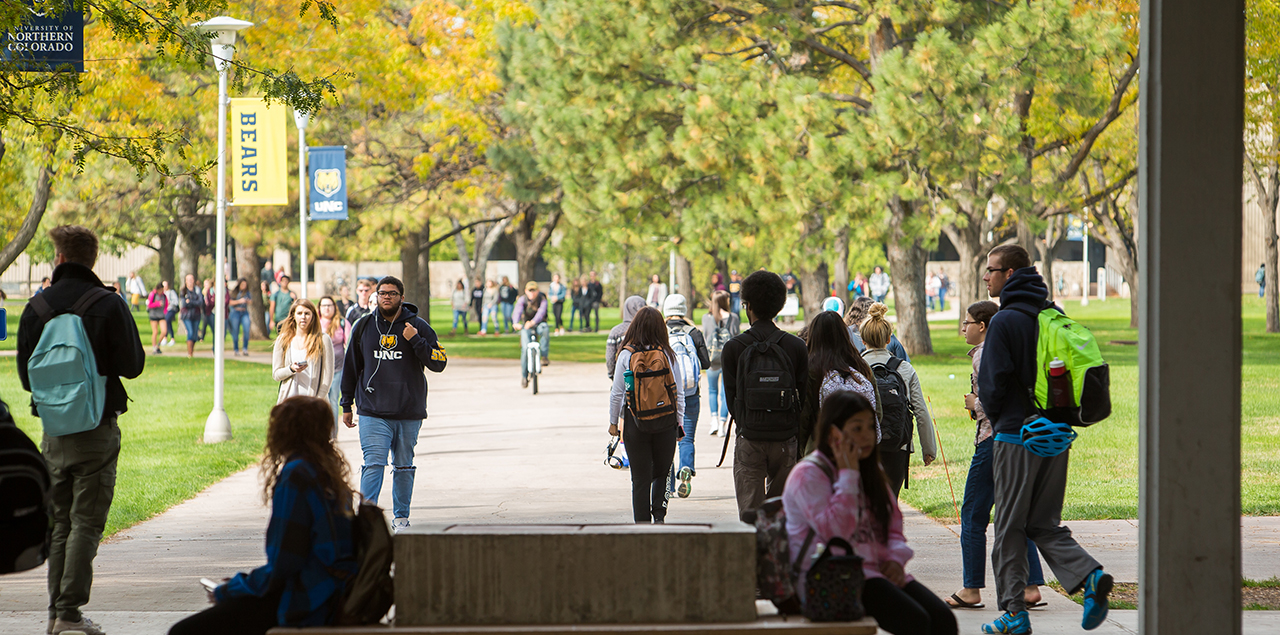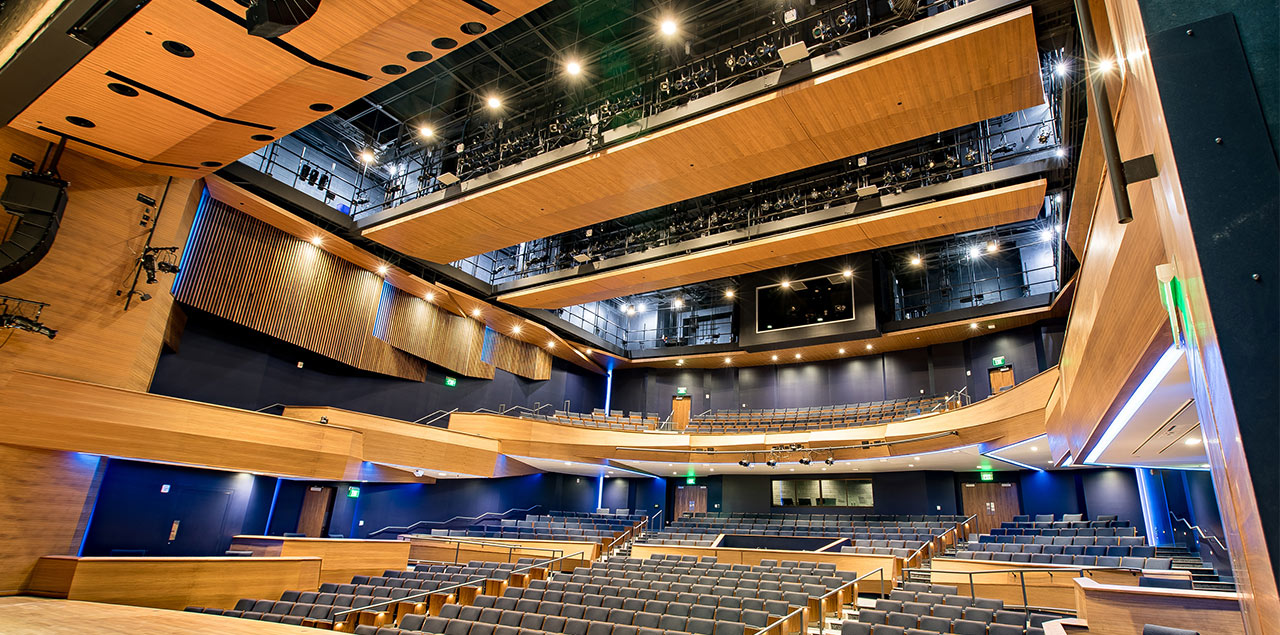Delivering his annual State of the University address on Oct. 15, University of Northern
Colorado (UNC) President Andy Feinstein shared an inspiring list of achievements that
reflect what he referred to as the relentless pursuit of the university’s dreams for
the future.
Among them were significant milestones from the past year that will undoubtedly change
the landscape of the university for decades to come, such as earning the federal designation
as Colorado’s newest Hispanic Serving Institution and successfully securing the investment
needed to proceed with opening UNC’s proposed College of Osteopathic Medicine (UNC
COM).
There are other victories as well; enrollment growth, historically high student retention
rates and record-setting fundraising efforts.
The successes result from thoughtful and deliberate actions guided by the institution’s
10-year strategic plan Rowing, Not Drifting 2030. Launched in 2020 the university entered the third of five two-year phases in July.
Before laying out the road map for the next two years, Feinstein paused to recognize
the hard work already completed and thanked the university community for their contributions.
“As I stand before you in my seventh year as president, I am filled with a deep sense
of pride and hope for the future,” said Feinstein. “I am inspired by all we have accomplished
working together with a shared sense of purpose. And I am confident that the best
is yet to come for our university.”
Before articulating what the university will prioritize during this next phase, Feinstein
took a moment to reinforce that he's equally invested in how the work is approached.
Taking inspiration from the book Unreasonable Hospitality by Will Guidara, he focused on the author’s concept that organizations benefit from
deliberately putting the people they serve at the center of every decision.
“Ultimately, the lesson is that we each have a role in going above and beyond for
our students, the communities we serve and for one another,” said Feinstein. “I invite
you to maintain a focus on how we can deliver on our commitments in a way that extends
hospitality.”
Watch the full State of the University below:
Prioritizing student success and creating a seamless experience from their first point
of contact through graduation topped the list of priorities Feinstein outlined for
the next two years. To achieve that he is realigning portions of the university’s
organizational structure to maximize efficiencies and take advantage of shared expertise.
The changes start with shifting the Department of Enrollment Services under the Division
of Academic Affairs, a move that puts the functions that engage, recruit, enroll,
support and graduate students on one team. UNC’s seven cultural and resource centers will also return to the Division of Student Affairs, a change that will bring together
the leaders, services and resources focused on supporting student success outside
the classroom.
Feinstein is also launching a search for a chief diversity officer who will continue
to champion the university’s commitment to diversity, equity and inclusion and lead
efforts aligned with the institutions new HSI designation. The new role will work
across university departments, divisions and colleges, providing thought leadership
on various issues, from policy design to organizational development and the creation
of communities of learning practice.
Other priorities that will remain at the forefront of the university’s work over the
next two years include:
- Recruiting and retaining excellent faculty and staff
- Implementing the Strategic Enrollment Management plan
- Effectively using technology to remove barriers for students
- Continuing the university's commitment as a Hispanic Serving Institution
- Developing a university-wide DEI plan
- Enhancing the university's curricular offerings and scholarship
- Being an environmentally sustainable campus
- Deepening connections with Greeley and Weld County's growing community
All the priorities Feinstein touched on alginwith the university’s five vision elements outlined in UNC’s strategic plan: Students First, Empower Inclusivity, Enhance and Invest, Innovate and Create and
Connect and Celebrate.
“The start of each new phase is an opportunity to both reflect on how far we have
come and renew our collective excitement about where we are headed. I have great optimism
about what we will be able to accomplish over the next two years because of how far
we have come over the past four.”
Feinstein encouraged those in attendance to think of the path ahead as more than words
on the website or in planning documents.
“I invite you to identify opportunities to align the work you are doing in your own
role at UNC and the overall direction outlined in our strategic plan. And remember
— we are here to create meaningful experiences for our students and to support their
development.”
Key Strategic Planning Achievements:
- Students First
Focused on a commitment to keep student success at the forefront of planning, Feinstein
shared several strategies the university has implemented aligned to UNC’s Strategic
Enrollment Management Plan. Over the past several years, the university prioritized
increasing both the accessibility and affordability of a college degree at UNC and
those efforts are paying off.
Feinstein credits enhancements to the admissions process and optimization of the financial
aid awarding model as key drivers to recent enrollment gains. The fall census showed
an increase in new, first-time undergraduate and graduate students, and the university’s
fall-to-fall retention reached a record high of 76%.
Some of the initiatives Feinstein highlighted include ¡Adelante! events, which provide better support for Hispanic and Latine-identifying students and their
families, and UNC’s First-Year Admission Guarantee, which provides guaranteed admission
to eligible Colorado high school students. He also touched on the new enhanced financial
aid awarding model, which increased financial aid awards to some of the most income-limited
students and families, and the UNC Tuition Promise, which covers standard tuition
and mandatory fees to eligible incoming and continuing undergraduate Colorado students.
The combination of initiatives focuses on removing barriers and confusion around higher
education and the application process for students and their families. They also provide
new pathways to affordability, particularly for students who come from traditionally
underrepresented populations.
The value of these efforts is supported by fall census numbers which show growth in
the number of underrepresented minorities, Pell-eligible students and first-generation
students.
- Empowering Inclusivity
Fall 2024 census numbers also showcased the university’s successful efforts as Colorado’s
newest Hispanic Serving Institution (HSI). The percentage of Hispanic and Latine-identifying
students climbed to 27%. That number is up 1% from last fall and has been on a steady
upward trend since fall 2022 when the enrollment was 25.5%.
UNC earned the federal designation last March from the U.S. Department of Education.
Highlighted as one of the key action items in the university’s strategic plan and
a top priority of Feinstein’s since he took over the presidency seven years ago, the
designation came a full 18 months ahead of schedule according to a comprehensive five-year plan launched in 2020 to attain HSI status by fall 2025.
“As I have said since we embarked on this effort, our commitment to becoming an HSI
has always been two-fold,” said Feinstein. “We have strived to exceed the enrollment
requirements for the designation. And, we have committed to doing the work necessary
to foster a sense of belonging for Hispanic and Latine students, their families, and
the broader community.”
- Enhance and Invest
With the belief that the success of UNC students relies on the strength of the university’s faculty and staff, Feinstein reaffirmed his commitment to recruit and retain quality employees. Building on the multiple compensation increases over the past two years, this year’s budget again provides pay increases for all employees. It also includes an additionaltargeted investment that increased compensation for faculty members who have had the lowest
parity comparisonsto their peers.
- Innovate and Create
UNC set the bar high in the competitive landscape of higher education this past year
with its innovative pursuit of opening a proposed College of Osteopathic Medicine
(COM). After a landmark $25 million gift from The Weld Trust — the largest in UNC
history — and a $169 million investment from the state of Colorado, the university
secured over $200 million for the project last year.
With funding in place, UNC is well on its way to welcoming its first class in what
will be Colorado’s third medical college as early as fall 2026. Other key milestones
from the past year in support of this project include the advancement of UNC COM to
Candidate Status by the Commission on Osteopathic College Accreditation, the second
of three stages the university must go through prior to reaching full accreditation,
and the ceremonial groundbreaking earlier this month of the new facility that will house the proposed college.
This ambitious vision to open a medical college on campus was spurred by a desire
to address the critical shortage and growing demand for doctors across the state,
region and nation.
In addition to the expansion into graduate medical education, the university has also
been updating undergraduate and graduate programs to ensure academic programs are
up to date and relevant.
“Over the past two years, we have focused on ways to be responsive to the evolving
expectations and desires of our students, and the needs of our community and state,”
said Feinstein.”
He also noted the $9 million faculty garnered last year in sponsored research, scholarship
and creative works and said he expects the university will achieve Carnegie’s R2 status this year, a classification that recognizes UNC as a doctoral university with
high research activity.
- Connect and Celebrate
With the belief that the success of UNC students relies on the strength of the university’s faculty and staff, Feinstein reaffirmed his commitment to recruit and retain quality employees. Building on the multiple compensation increases over the past two years, this year’s budget again provides pay increases for all employees. It also includes an additionaltargeted investment that increased compensation for faculty members who have had the lowest
parity comparisonsto their peers.






